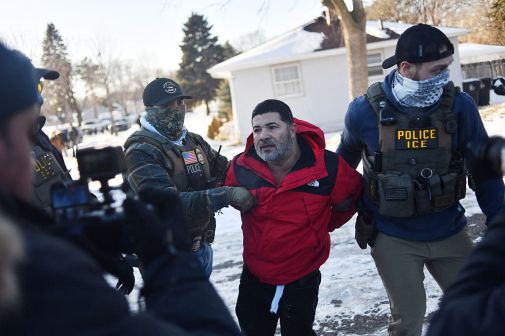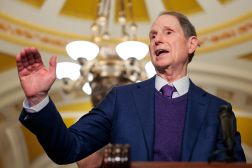In 25 minutes Tuesday, Homeland Security Secretary Janet Napolitano gave the coda to her 4.5 years of work as the head of one of the newest and most sprawling federal agencies.
The department has learned many lessons in her time, Napolitano said — responding to issues ranging from the H1N1 virus, to the Deepwater Horizon oil spill, to drug cartel violence, to terrorist plots and natural disasters. Her agency — just a decade old and composed of 240,000-plus people spanning 22 disparate agencies — has been criticized from the left for its record deportation levels and from the right for allowing immigrants brought to the United States as children to apply for provisional legal status.
In all instances, DHS — and the country — are better off for the decisions it’s made, she said.
“In a world of evolving threats, the key to our success is the ability to be flexible and agile, and adapt to changing circumstances on the ground — whether that is across the globe, or here at home,” she said. “I believe we are seeing that approach bear fruit in a profound, positive way.”
But evolving threats mean new challenges lie ahead for Napolitano’s yet-to-be-named successor (Napolitano’s last day is Sept. 6, after which she will become president of the University of California system). An Internet-connected world will eventually bring a “major cyber event that will have a serious effect on our lives,” she said. Climate change foretells a more “severe nature” and more “weather-related events.”
“You will need a large bottle of Advil,” Napolitano said in her “open letter” to her successor.
But Napolitano mainly focused on the positive throughout her speech, addressing criticisms of the agency during her tenure.
The country is better equipped to handle terrorist attacks, she said. Law enforcement’s response to the Boston Marathon bombings earlier this year — the one major terrorist attack during Napolitano’s time — represented years of preparation and lessons learned.
“The well-timed and coordinated emergency response that immediately followed the marathon attack was not accidental,” she said. “It was the product of years of planning, training and investment in building state and local capacity.”
The department had run 12 training exercises with Boston police, including one last November simulating such a scenario. DHS helped create the Medical Intelligence Center, which helped hospitals share information about victims — three dead and 260 total injured — the day of the attack. And the department’s “If You See Something, Say Something” campaign encouraged citizens to turn in video that helped identify the suspects.
“This terrible tragedy could have been far worse,” she said.
Napolitano was also at the helm during two other foiled terrorist plots. A man attempted to set off an underwear bomb on a flight headed for Detroit in 2009, and an al-Qaida cell tried to hide explosives in printer cartridges headed to the U.S. in a cargo plane in 2010.
She drew criticism after the 2010 incident for saying “the system worked,” and later apologized. Tuesday, Napolitano discussed changes made to “the system” after these incidents. Cargo-scanning procedures have changed, information on airline passengers is now more available at overseas airports and 190 countries have signed an agreement to improve aviation security.
At home, the country has been ravaged by historic natural disasters in recent years, Napolitano admitted. Hurricane Sandy alone destroyed 650,000 homes, causing $50 billion in damages across 24 states and taking 70 lives. But DHS brought a new approach to this and other natural disasters such as Hurricane Irene and tornadoes in Joplin, Mo., Tuscaloosa, Ala., and Moore, Okla.
When Sandy hit in October 2012, “we had a plan, we had people in place, and we had resources at the ready,” she said. The president pre-declared emergency status in 12 states, opening up federal funds; FEMA moved into place ahead of time; and the DHS Surge Capacity Force, a new volunteer corps of DHS employees, was deployed.
“The collective response to Sandy reflects an emergency management system that is swift, flexible, adaptable and united,” Napolitano said. “And it has made all the difference in our ability to speed resources to impacted areas, identify survivor needs and help communities recover and rebuild.”
Along the country’s southern border, Napolitano defended the decision to invest “historic resources” in border security, pointing to the near-40-year-low in illegal crossings. She called the decision to prioritize deportation of criminals “common sense” and did not back down from the fact that “last year, we removed more serious criminals from the United States than any time in our history,” she said.
Within U.S. borders, the decision to grant two-year provisional legal status to immigrants brought over illegally as young children has allowed 430,000 young people to “continue to contribute to the country they call home,” she said.
But Napolitano did call on Congress for its assistance. Provisional legal status is “no substitute for comprehensive immigration reform, which is the only way to face the longstanding problems with our immigration system.”
With that, Napolitano turned to her faceless successor.
“Some have said that being the secretary of DHS is the most thankless job in Washington. That’s not true,” she said. “No doubt, it is a very big and complex job. It is literally a 24/7 job. Yet, as my successor will soon learn, it is also one of the most rewarding jobs there is. What you do here matters to the lives of people all across our great nation, and your decisions affect them in direct, tangible ways.”
Then Napolitano quickly wrapped up her speech, gave a minibow and small wave to the standing audience, shook one hand and walked off, leaving only her legacy behind.






